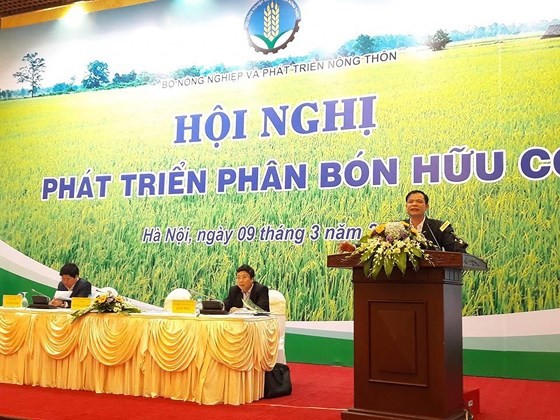
As of December, 2017, the number of registered organic fertilizer products for agricultural production is 713, accounting for 5 percent compared to total products registered with 14,318.
According to the Ministry of Agriculture and Rural development (MARD), manufacturing and using fertilizers in moderation will help increase productivity and produce quality.
However, for a long time, Vietnamese farmers have used synthetic or inorganic fertilizers which depleted the quality of soil and badly impacted on fruit and vegetable meanwhile organic kinds - an essential element for the growth of microorganisms in the soil can help improving humus in the soil , the growth of microorganisms in addition to providing nutrients to the soil.
Developing production of organic fertilizers both boosts organic agricultural production and takes advantage of waste products in planting, breeding and revamp soil environment.
However, at present, the country has 180 licensed manufacturers to make organic fertilizers, accounting for 24. 5 percent over 735 units. These 180 manufacturers make 2.5 million tons annually, just accounting for 0.1 percent compared to their chemical fertilizer plants with 26.7 million tons a year.
Therefore, at the meeting, experts warned that this is good opportunity for investors to pour capital into producing organic fertilizers in next 5 - 7 years.
Speaking at the meeting, Minister of Agriculture and Rural Development Nguyen Xuan Cuong proposed enterprises adopting hi-tech in manufacturing organic fertilizer to protect environment. Moreover, he promised to have preferential policies to support firms.
Additionally, the Ministry will increase supervision on the quality of fertilizers to set order in production and business of fertilizers. The Ministry petitioned the government to have preferential policies in production capital, special treatment in soil hiring as well as tax exemption for individual and organizations to make organic fertilizers.
Moreover, the government should have mechanism to support firms to build their brand names and growth of production.
The Minister suggested local administrations encouraging farmers to increase utilization of environmentally friend fertilizers as well as enhance supervision to discover fake fertilizers or low quality kinds.
























